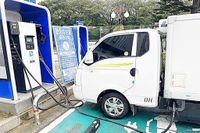Electric vehicles (EVs) are rapidly gaining traction in Thailand, signaling a new era for the automotive market. However, challenges remain, particularly with the country's charging infrastructure. As of now, there are only 41 charging stations available nationwide, which raises concerns among potential EV owners about the feasibility of making the switch.
According to a report published on April 18, 2025, the Thai electric vehicle market has seen significant growth over the past five years, with sales reaching approximately five thousand units. This surge in demand comes amidst increasing government support and local initiatives aimed at promoting electric vehicles. However, the rapid expansion of electric vehicle ownership has not been matched by a corresponding increase in charging stations, leading to what many are calling a "charging stress" among consumers.
One of the most prevalent complaints from EV users is the inconvenience associated with charging their vehicles. Many public charging stations often face operational issues, primarily due to outdated equipment, which exacerbates the already limited availability of charging options. This situation is further complicated by the fact that many charging stations are monopolized by electric trucks and delivery vehicles, making it challenging for personal car owners to access them, especially in densely populated urban areas.
The physical limitations of urban spaces make it difficult to expand the number of charging stations, and the gap between supply and demand continues to widen. Additionally, recent media coverage of electric vehicle fires has led some condominium and commercial building owners to hesitate in installing charging stations, indicating a need for improved public awareness alongside infrastructure development.
In response to these challenges, the Ministry of Environment has announced new guidelines aimed at increasing the supply of electric vehicle chargers. This plan includes enhancing maintenance obligations and increasing subsidies to ensure the quality of charging stations. However, critics argue that these measures may not be effective enough for drivers who are already experiencing discomfort due to insufficient and malfunctioning chargers.
There is a pressing need for user-centered solutions, such as real-time information on charger availability and rapid response systems for addressing malfunctions. The focus should not just be on the sheer number of installations but rather on the actual availability of functioning chargers.
Electric vehicles are no longer just a futuristic mode of transport; they are becoming a necessity in today’s world. For the electric vehicle ecosystem to truly thrive, it must be supported by tangible changes that drivers can feel and experience in their daily lives.
Meanwhile, the automotive market is also witnessing a shift in public interest towards personalities associated with the industry. One such figure is Mayda Patcharabusayakorn, who has recently made headlines as a brand ambassador for the Motor Show 2024 and as a key member of the team for popular singer Tono Pakin.
Mayda, who started her career as a university faculty member, has transitioned into a prominent role within Thailand's event scene, serving as an MC for various high-profile events. Her popularity soared after she was crowned the ambassador for the Motor Show 2024 and participated in the AClass Girl Thailand 2024 competition at the Bangkok Auto Salon. Additionally, she is the owner of the trending online lingerie brand, miso.bra.
Since joining Tono’s team, Mayda has become a topic of conversation across social media platforms. Her Instagram is filled with stunning images, including a recent post where she flaunted her beauty in a two-piece outfit while on vacation, accompanied by a caption that reads, "If you have the ability to love, love yourself first."
As the electric vehicle market continues to evolve in Thailand, figures like Mayda Patcharabusayakorn are drawing attention not just for their professional achievements but also for their influence in shaping public perceptions around the automotive industry.
In summary, while the electric vehicle market in Thailand showcases promising growth, the accompanying infrastructure must catch up to ensure a smooth transition for consumers. At the same time, the rising stars in the automotive scene, such as Mayda, reflect the changing dynamics and interests within the industry.


